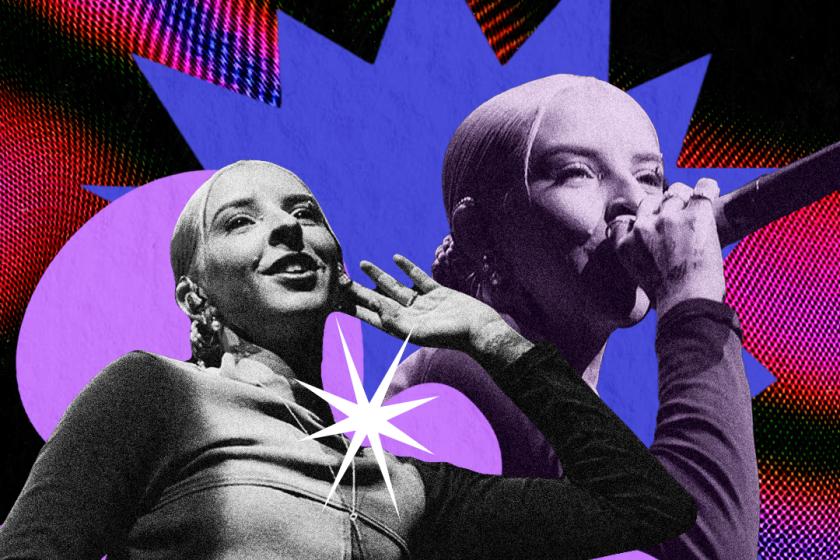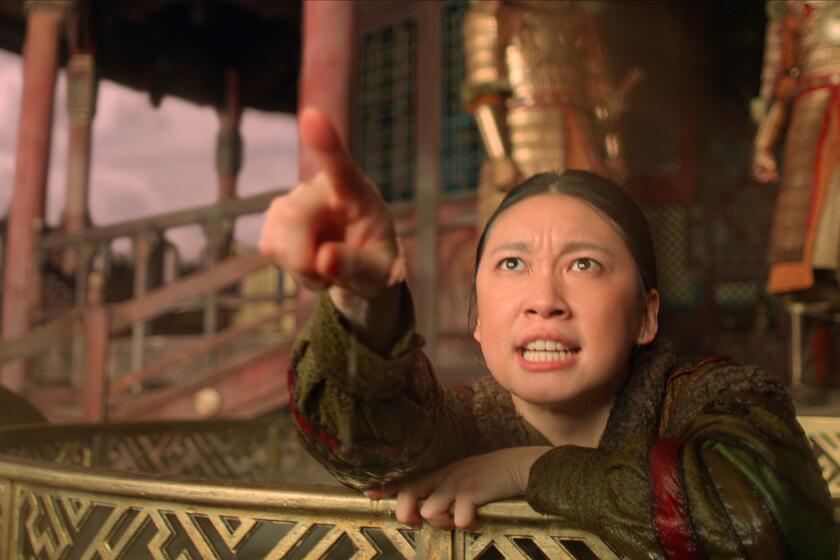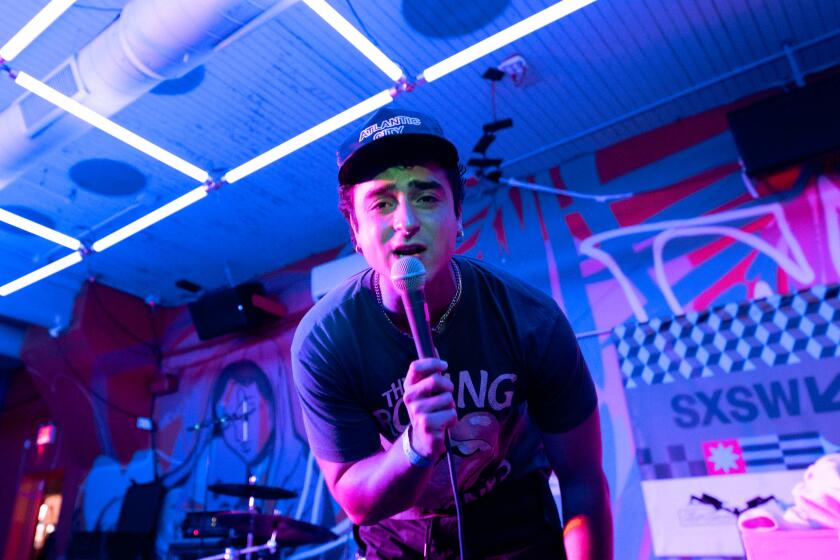Inside the ‘absurdist’ ‘concept album’ that is ‘Atlanta’ Season 3
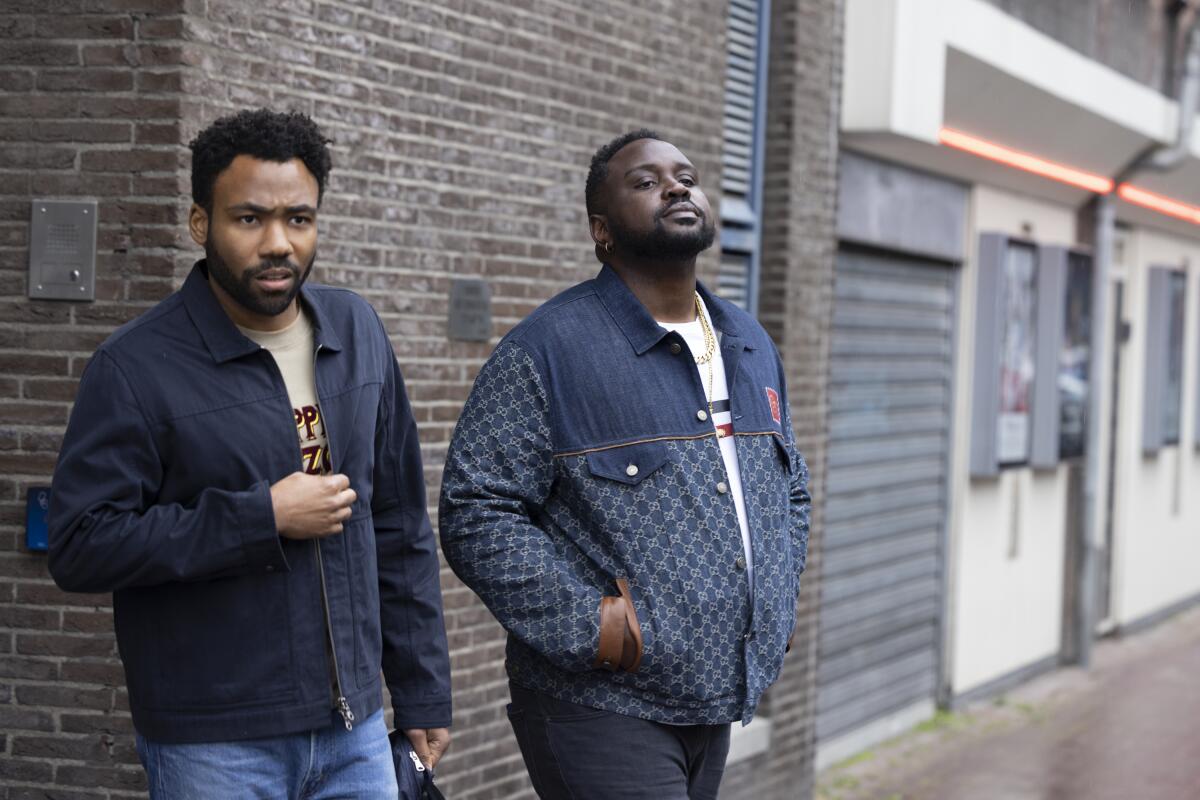
- Share via
The last time a new episode of “Atlanta” aired was in May 2018. And obviously, much has changed since then — if not “Atlanta” itself, whose third season, premiering Thursday, opens with a stand-alone horror story before shifting the action to Europe. (A fourth and final season has already been shot and is set to premiere later this year.)
Created by and starring Donald Glover, the show follows the exploits of his character, Earnest “Earn” Marks, a college dropout who returned home to Atlanta and has been struggling to find direction in his life. He latches onto managing the rap career of his cousin, who goes by Paper Boi (Brian Tyree Henry), while dealing with his on-again, off-again relationship with Van (Zazie Beetz), mother of their daughter, Lottie. Also in their orbit is Paper Boi’s friend and right-hand man, Darius (LaKeith Stanfield).
In the time since the previous season, the cast’s careers have all taken off in different directions, with Glover achieving greater fame as a musician working under the name Childish Gambino, while Beetz, Henry and Stanfield have all pursued successful film careers.
What remains intact is the series’ eccentric, unpredictable allure. Among the key collaborators in crafting its incredibly bold and free storytelling — taking time out for an episode where Paper Boi gets lost in the woods or Darius meets the gloriously weird one-off character Teddy Perkins — is director Hiro Murai, who transitioned from a successful career directing music videos to working in television and was recently nominated for a DGA Award for his work on HBO Max’s series “Station Eleven.”
A few days before a screening of the Season 3 premiere closed the South By Southwest Film Festival, Murai got on the phone from his home in L.A.’s Silver Lake neighborhood to talk — as much as he could — about what to expect from the upcoming seasons.
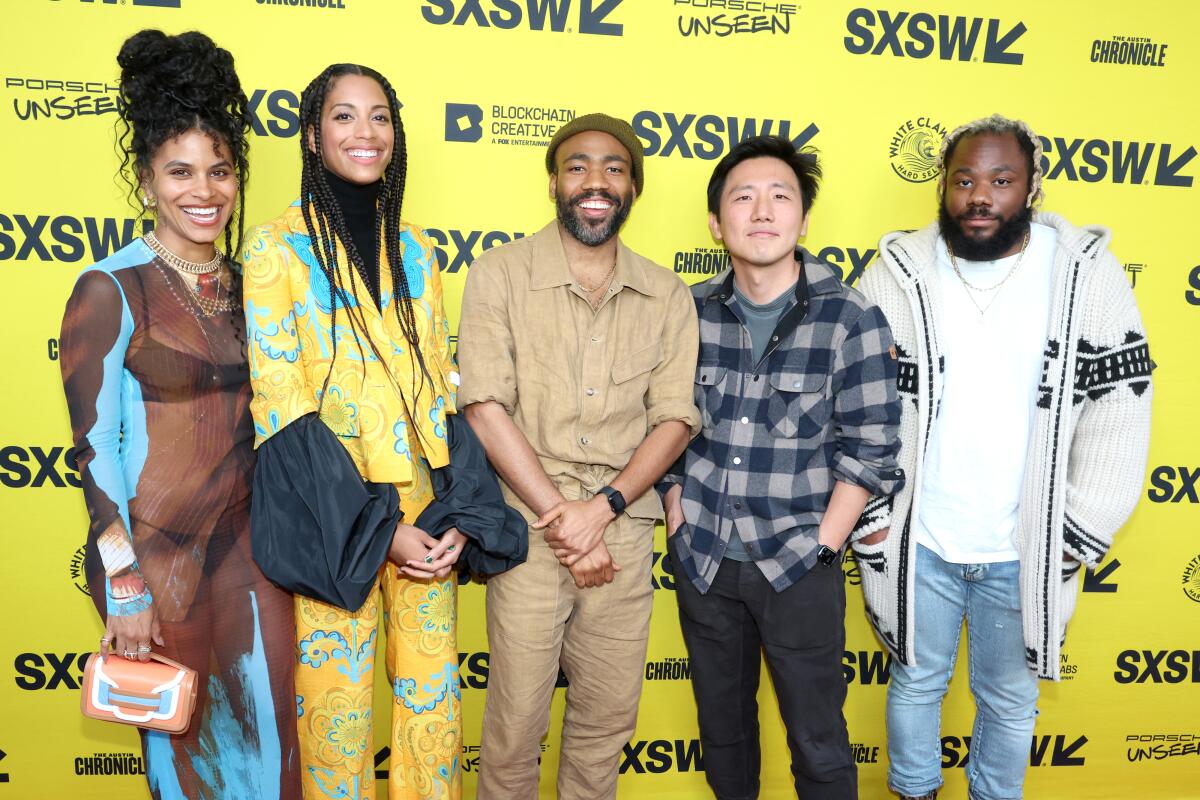
Considering the long break in production between Seasons 2 and 3, what was it like returning to shoot Seasons 3 and 4 back-to-back?
We’re reuniting in London during a pandemic, and none of us had seen humans for at least a year. So, in some ways, it was the most “Atlanta” reunion ever: It was the strangest circumstance for a reunion. But it was really kind of lovely and emotional because we all started working in television together on this show, with the exception of Donald. And since then, we’ve done so many things, but it was nice to come back together and look back on the show and how it was working together back then and who we are now.
The main cast of the show — Donald, Zazie, Brian and LaKeith — their careers have all taken off in such exciting ways since the show started.
In some ways, I was really nervous, ‘cause I think what was great about the first two seasons, just the experience of making it anyway, was that it just felt very scrappy, and we felt like a very tight unit. I was half expecting to come back and half of us be divas or something, but as soon as we got in a room together, it just kind of all clicked in again. It just felt very familiar, like we grew up together in a family or something and we were coming back together for a reunion. And so my worries, they dissipated pretty quickly.
What can you tell me about that decision to take the show to Europe? Both story-wise and production-wise, that feels like a real break from a lot of what “Atlanta” has done before.
Everything we do on the show just comes out of what naturally happens in the writers room, with Donald and all the writers. And I think they had a lot of stories to tell and things to unpack from being away from home, being on the road. It’s such a big part of being a musician. There’s something specifically very fish-outta-water about touring Europe, ‘cause obviously all the cultural things, but you are also bringing American Black music to a different land, so the story naturally bent that way. But obviously, the show, it’s also a very weird thing to have a three-year absence. And then kind of take out the core element of the show, which is the city of Atlanta, for the show. It was almost like a thought experiment: What does this feel like in this new setting with these different faces?
What was it like shooting the show in these different locations?
In some ways, it feels like a weird one-season spinoff of the show. I think it informed a lot about aesthetic choices and how we wanted to approach these stories. And I think we did something very different from Season 1 and 2. But I also think it’s very authentic to how we felt at the time that we made it. We were in a tight bubble because of the pandemic, and we felt a little bit disconnected from the world, and it was a little bit isolating. And obviously all the places we visited were so gorgeous, but it was kind of in this strange pandemic time.
From what audiences know about this new season, it deals with how racism travels internationally, the way it’s different from country to country and place to place. Is that your experience as a Japanese American, are the microaggressions or ways that racism reveals itself different from Germany to England to Italy than they are in New York or L.A.?
I think that’s always true: You’re trying to bridge culture gaps, and a lot of it is how people treat race. I can only speak from my own experience, but I think a big takeaway for me was that maybe race is less central to conversations outside of the States. Maybe it’s less ingrained in the story of each country. In talking about racism, it’s highly unavoidable when you’re talking about the history of America in a way that’s maybe not the case as much in some of the countries we visited. So even that was just a strange thing to negotiate and realize as you were telling these inherently charged stories about race with different crews in different countries.
Did the scripts or the story for Season 3 change much because of the pandemic and the break that you all had in production?
[Writer and producer] Steve Glover talked about this: A lot of the concepts that they were really interested in for Season 3 were baked pre-pandemic. And I think they felt weirdly like the cultural conversation was catching up to what they were talking about. And so Steve always wanted to make clear that we started writing this not as a reaction to a lot of the things that’s happened the last couple years, but it feels extra-pertinent now, given everything that’s happened.
And does that have to do with the pandemic or more with the cultural conversations around race stemming from George Floyd?
The cultural conversation around race and obviously all the George Floyd stuff. We never directly talk about anything that’s happened in the last couple years, but white privilege and a lot of the conversations that’s really been visible in the last couple years, it’s definitely in the stories we tell.
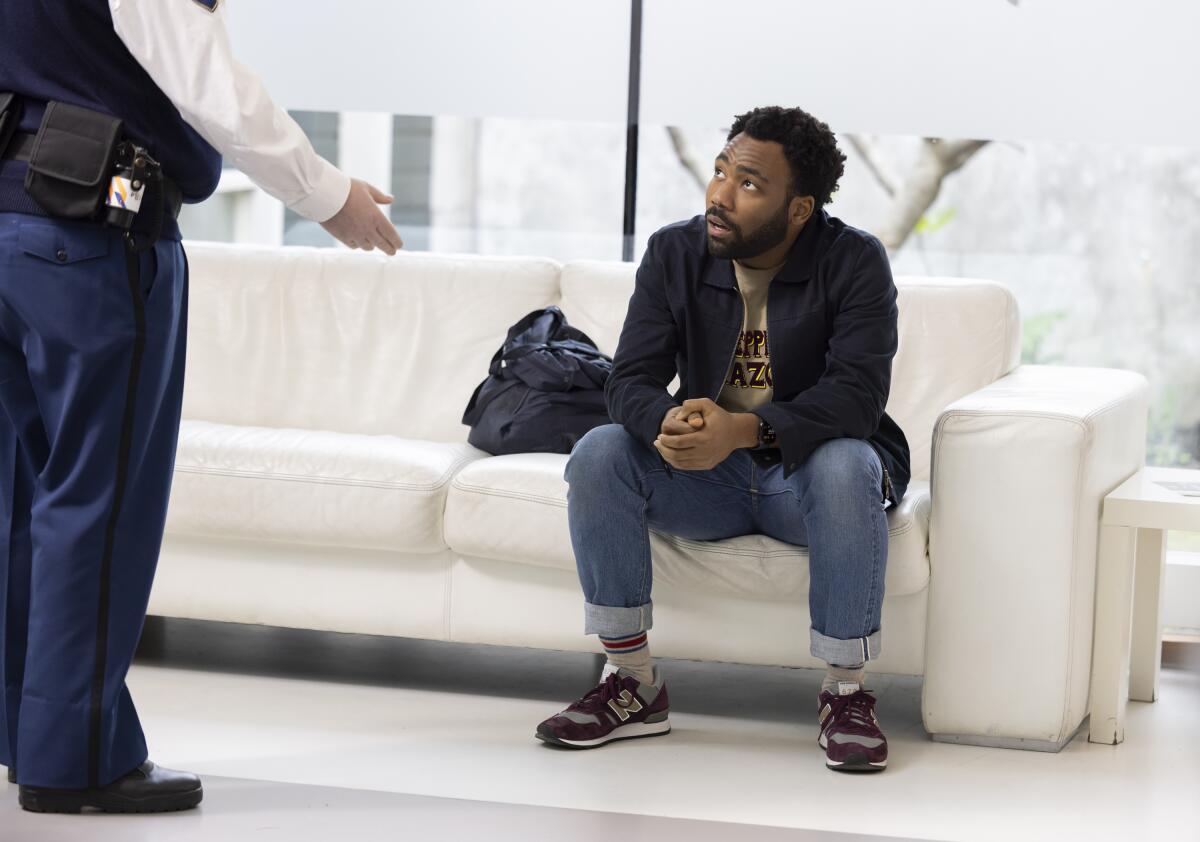
The loglines for each episode, the official descriptions, are enigmatic and difficult to parse. One of them says “Season 1 was better.” How do you feel about that?
How do I feel about the logline “Season 1 was better”? I think the loglines, part of it is that we just don’t want to give away what the season is, but also a lot of the stuff we talk about, I think we talk about in a kind of irreverent, not-so-self-serious way. And we also don’t want to put anything that we touch on a pedestal. I think, at the end of the day, the show shouldn’t be consumed as an academic show. This is a half-hour comedy with a lot of silly stuff in it. We just try to be very honest about some of the social subjects that we personally experience and the lens that we see it in.
Another logline says, “I was legit scared watching this.” So who is the “I” of those loglines?
I think Steve wrote all of those, actually. But I think that logline is — ah, man, I don’t think I can say anything without ruining these episodes. I’ll say it’ll all make sense once they air.
You’ve always seemed to shoot the show in this kind of flat, unaffected style that creates this great tension with the sideways dream logic of some of the storytelling. As you’ve traveled to Europe, did you keep that same kind of visual style?
I think our approach has always been: We write it like a comedy, and we shoot it like a drama. You’re kind of hiding the jokes between deadpan realism and hoping that the jokes can blend in with things that are shocking or surprising or horrifying about some of these episodes. We definitely took the same approach going into Europe, but just inherently, it became a different season because of the environment we were in. And some of the stories we were telling are a little more heightened too. I think the voice is the same. I would say it’s a little more like maximalist or absurdist than what’s been baseline “Atlanta.”
From “Atlanta,” but then also the “This Is America” video or “Guava Island” project, you seem to have such a strong collaboration with Donald — the two of you really seem to understand each other and work well together. Why do you think that is?
We never really questioned it. I think we have a similar taste, and we have very complementary strengths; our strengths are just kind of clicking together. He’s like a writer-performer, and I’m very visual and camera-oriented. And I love post and putting sequences together and editing. It always felt very, very easy with him. We never had to struggle. I always kind of compared it to a game of hot potato. You just kind of tossed the thing back and forth. And then by the time we’re done, it’s always something interesting. I try not to be too analytical about it because I don’t want to ruin it. I think it’s just chemistry, like anything else.
Can you give any hints as to where these seasons are going? What’s the endgame, especially for Season 4? What should audiences expect?
I’ll say every season is very distinct and very different, between 1, 2, 3 and 4. And I’m hoping that, at the end of the series, you’ll be able to watch all the seasons as like a mega-arc to the show. Not in an intricate “Lost” plot kind of way. Season 3, I think it’s a kind of a concept album — we’re trying a lot of different things, and I think you’ll see some wild swings. I think it’s very experimental. Season 4, I think, is kind of a homecoming for us. Not just ’cause we’re back in Atlanta, but we’re kind of revisiting a lot of the things that worked for us in the first season, but at the same time you’re kind of realizing that we’re not the same people that made the first season. And so what I love about Season 4 is it has a kind of a cyclical, full circle feeling. And it also feels like a proper ending because of that.
Do you see yourself moving into features? For people who are fans of your work, I think they would be very excited to see you make a feature film.
I’d be very excited to do that too. I’m developing a few things, but I think for me, the medium, the frame is less important. And as long as I get excited about what’s inside the frame, I’ll work on that. I haven’t really prioritized whether it’s a feature or a TV show. I’m just kind of floating toward whatever is the most exciting thing to me in the moment. But gradually, eventually, I would love to do a feature.
Do you know what you’re directing after you’re done with Season 4?
I’m doing another project with Donald for an episode or two. And then we actually go back to editing Season 4 in the summer. So we’ll be basically editing “Atlanta” for a good chunk of the year, which is why I’m stammering as I’m trying to explain these seasons because we haven’t quite made them yet.
More to Read
The complete guide to home viewing
Get Screen Gab for everything about the TV shows and streaming movies everyone’s talking about.
You may occasionally receive promotional content from the Los Angeles Times.





